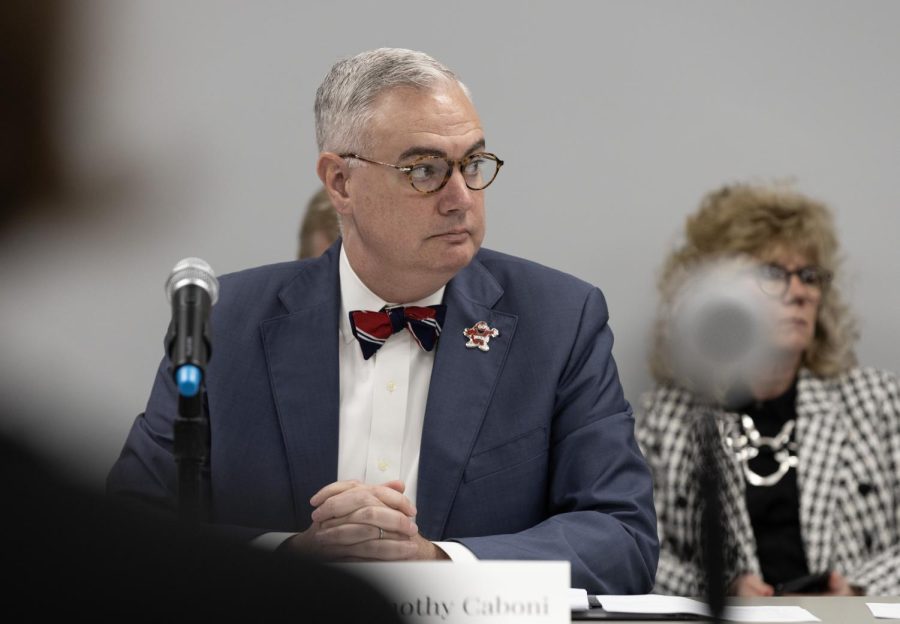Board of Regents approves 3% tuition increase, operating budget
WKU President Timothy C. Caboni listens to a speaker during the quarterly Board of Regents meeting at the WKU Innovation Campus on Friday, March 3, 2023.
June 3, 2023
The WKU Board of Regents approved the university’s 2023-2024 operating budget, which includes a 3% tuition raise, at a specially called budget approval meeting on June 2.
The operating budget for 2023-2024 was approved to be $389.9 million, a 2% increase from the 2022-2023 operating budget.
There were no changes to the new operating budget since it was first presented at the May Board of Regents meeting.
Some revenue increases in the budget come from a 3% tuition raise, which affects tuition for residents and military veterans/dependents. The tuition rate for international, nonresident and tuition incentive program participants holds flat for “recruiting purposes,” Susan Howarth, WKU executive vice president for strategy, operations and finance, said.
Howarth also said the financial aid increases over recent years have “far exceeded” the tuition increases.
“Compared to inflation, it [tuition] is a moderate increase,” WKU President Timothy Caboni said. “Another reason it is necessary is that we want to continue to give [faculty] raises.”
The operating budget also includes a 2% university-wide salary increase pool set for January 2024. Salaries and wages and fringe benefits make up a majority of the budget’s expenditures.
Shane Spiller, faculty regent, questioned the role of faculty members and their retention in budget planning, as the RAMP model places budget planning for each academic college as the work of the dean’s offices.
“We have a culture of exclusion of the differences in the deans, and [we] are giving them the budget to build that up,” Spiller said.
Spiller described he has heard and seen from faculty that some deans are being perceived as inaccessible.
“What I’m hearing and what I’m seeing is that there is empire building, that they [deans] have much more staff,” Spiller said. “They have built [what] one college called a ‘moat.’ One college called it a ‘bunker,’ where they’re not talking with faculty.”
Caboni said this was a natural shift in expenditure power and that the deans make their budget decisions based on faculty needed in the college and staff needed in their office.
“The notion that deans don’t want to engage their faculty, that’s antithetical to being a dean,” Caboni said.
Caboni believes that the RAMP model has in fact brought budget planning closer to faculty by being at a college level.
Spiller also questioned the small number of faculty members on the budget planning committee. Caboni said there will not be overwhelming numbers of faculty joining these votes, as it is not in their “domain of expertise.”
“We’ve created transparency for faculty, we’ve created the ability to have input for faculty and really deep engagement around a budget that was never transparent before, but we’re not going to have a budget that is controlled by faculty,” Caboni said.
The Board of Regents held regular committee meetings after the special budget approval meeting.
The Academic Affairs committee presented five action items, and all were approved. The Board approved the suspension of the Russian and East European studies minor. It will approved three new undergraduate certificates in teaching English to speakers of other languages, strategies for trauma informed approaches to improving resilience, and professional and technical writing. Approval of emeritus recommendations will also be presented.
The Finance and Budget committee then presented personnel actions and an internal audit work plan, both of which were approved.
Editor-in-chief Alexandria Anderson can be reached at alexandria.anderson337@topper.wku.edu.















